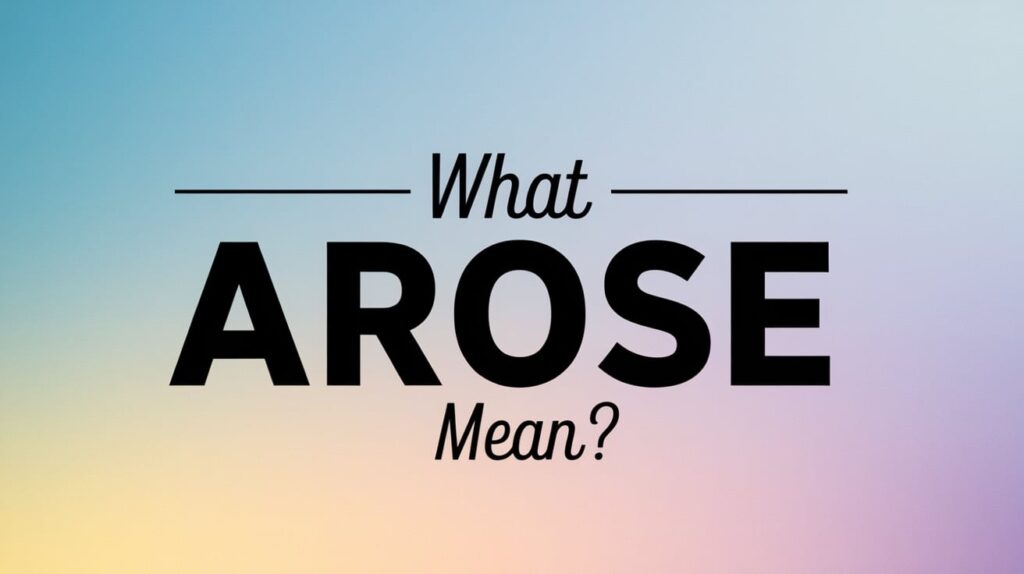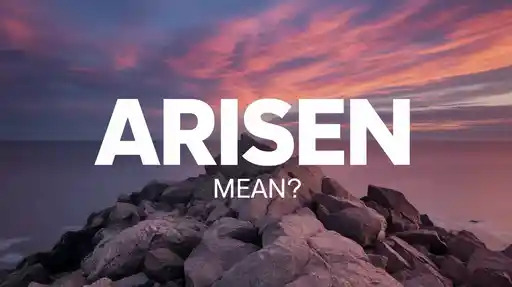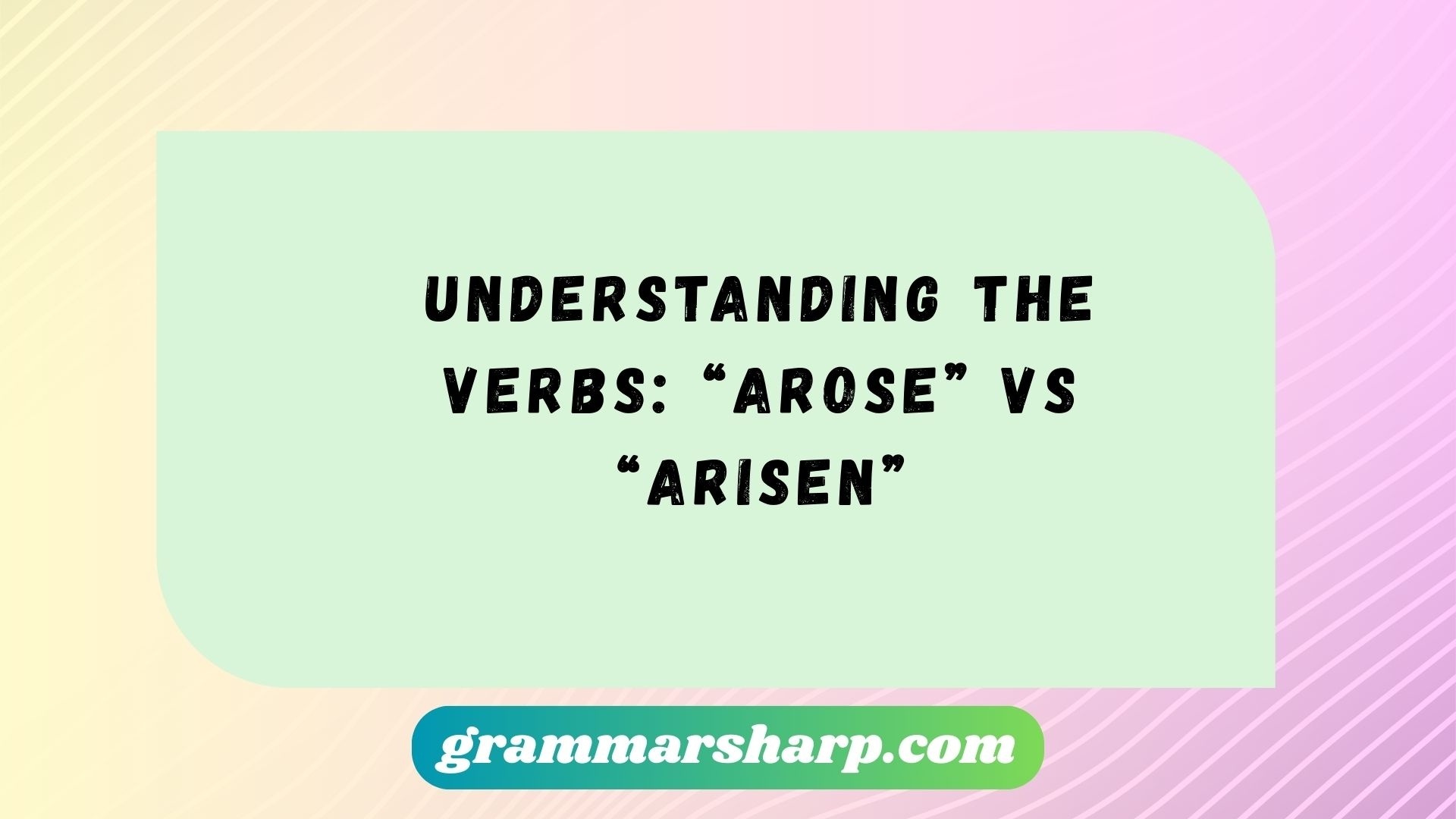English verbs can be tricky, especially irregular ones that don’t follow the neat rules of regular past tense endings. Two words that often confuse learners and even fluent speakers are “arose” vs “arisen.” Both come from the base verb “arise,” but they serve different grammatical functions.
Imagine reading two sentences: “He arose from his chair” and “A problem has arisen.” At first glance, you might think the verbs mean the same thing. In reality, they represent different forms and uses of the same root.
Why does this matter? Because choosing the wrong form can change the tense of your sentence or make it sound ungrammatical. Native speakers may instinctively pick the right one, but learners often struggle without a clear explanation.
In this guide, we’ll unpack everything about “arose vs arisen.” You’ll learn the exact difference, how to use each correctly, common mistakes to avoid, and practical examples from daily life, literature, and professional writing. Along the way, you’ll find tables, diagrams, and memory tricks to help you master the usage once and for all.
By the end, you’ll never hesitate when deciding whether to write arose or arisen.
Quick Answer: The Difference Between “Arose” and “Arisen”
Let’s start simple.
- Arose = past tense of arise (used to describe something that already happened).
- Arisen = past participle of arise (used with have, has, or had to form perfect tenses).
Think of it this way:
- Yesterday → She arose early.
- Today → She has arisen early.
Here’s a quick comparison table for clarity:
| Verb Form | Tense | Example Sentence |
| Arose | Simple Past | A new idea arose during the meeting. |
| Arisen | Past Participle (with have/has/had) | Several issues have arisen since yesterday. |
👉 Key takeaway: Use arose for events in the past. Use arisen when you’re building a perfect tense with an auxiliary verb.
What Does “Arose” Mean?

The verb “arose” is the simple past tense of arise. It describes an event or action that happened in the past and is now complete.
Examples
- She arose from her bed at dawn.
- A conflict arose between the two teams.
- He arose quickly when his name was called.
In all of these cases, the action is finished and clearly belongs to the past.
Here’s a subject + verb mini table:
| Subject | Past Form | Example |
| I | arose | I arose before sunrise. |
| He/She/It | arose | She arose when the alarm rang. |
| We | arose | We arose earlier than expected. |
| They | arose | They arose to greet the guests. |
👉 Tip: If you can insert a specific time marker (yesterday, last night, two days ago), then arose is usually the correct choice.
What Does “Arisen” Mean?

The verb “arisen” is the past participle form of arise. Unlike “arose,” it cannot stand alone as the main verb in a sentence. It always works with auxiliary verbs like have, has, or had.
Examples:
- Many questions have arisen since the new policy began.
- A rare opportunity has arisen for young entrepreneurs.
- Several challenges had arisen before the project started.
Notice how each example pairs arisen with an auxiliary verb. Without have, has, or had, the sentence would be incorrect.
Here’s a simple pattern chart:
| Auxiliary Verb | Past Participle | Example |
| Have | arisen | Problems have arisen in the community. |
| Has | arisen | A new idea has arisen from this research. |
| Had | arisen | Concerns had arisen before the vote. |
👉 Tip: Think of arisen as “attached” to another helping verb. On its own, it doesn’t work.
Grammar Rules: When to Use “Arose” vs “Arisen”
To avoid mistakes, remember these rules:
- Use arose when talking about a finished action in the past.
- Example: She arose late yesterday.
- Use arisen when the action connects to the present or another past action through the perfect tenses.
- Example: Several opportunities have arisen this year.
Common Mistakes
- ❌ Problems arisen yesterday.
- Problems arose yesterday.
- ❌ She has arose early today.
- She has arisen early today.
👉 If you’re using has, have, or had, always go with arisen. If you’re just narrating the past, use arose.
Conjugation of “Arise” (Present, Past, Past Participle)
The verb arise doesn’t follow regular conjugation patterns. Here’s the complete chart:
| Tense | Verb Form | Example Sentence |
| Base Form | arise | New ideas arise during brainstorming. |
| Present (3rd person singular) | arises | A problem arises when we skip planning. |
| Present Participle | arising | Opportunities are arising every day. |
| Past | arose | He arose from his chair. |
| Past Participle | arisen | Difficulties have arisen in recent months. |
This irregularity makes arise similar to verbs like begin → began → begun or go → went → gone.
Common Expressions and Phrases Using “Arise”
The verb arise often appears in specific expressions:
- “A problem arose” → something negative happened.
- “The need arose” → a requirement became clear.
- “A question has arisen” → uncertainty or curiosity developed.
- “Circumstances arose” → conditions or events occurred.
- “An opportunity has arisen” → a chance appeared.
Example sentences
- A serious conflict arose between the two communities.
- The need for stronger policies has arisen due to climate change.
👉 Using these expressions makes your writing sound more natural and advanced.
Visual Guide: Spotting the Difference
Here’s a simple decision tree to choose the right word:
Usage in Literature, Business, and Daily Life
In Literature
Writers have long used arise, arose, and arisen in dramatic ways
- Shakespeare wrote, “The occasion arose, and he seized it.”
- In the Bible, phrases like “A new king arose” or “A prophet has arisen” are common.
In Business
- A conflict arose between management and staff.
- New opportunities have arisen with the digital market.
In Daily Life
- She arose early to catch the train.
- A problem has arisen with the internet connection.
👉 Whether in formal or casual writing, choosing the correct form sharpens clarity and credibility.
Quick Tips to Remember the Difference
- Mnemonic: “Yesterday I arose, today I have arisen.”
- Think of arose as a standalone past tense.
- Think of arisen as the team player—it needs have, has, or had.
Side-by-side mini chart:
| Use This | When | Example |
| Arose | Past action, finished | The storm arose suddenly. |
| Arisen | Perfect tense with auxiliary verb | A storm has arisen in the region. |
FAQs
Is “arisen” still common in modern English?
Yes, though less frequent in casual speech, it appears often in formal writing, literature, and professional contexts.
Can I use “arise” instead of “get up”?
Sometimes, yes. He arose from bed means he got up from bed. But arise also means to emerge or occur, which get up does not cover.
What’s the difference between “arose” and “rose”?
- Arose = past of arise.
- Rose = past of rise.
Example: The sun rose vs A problem arose.
Conclusion
Mastering “arose vs arisen” is less about memorizing and more about understanding their roles.
- Use arose for a completed past action.
- Use arisen with perfect tenses.
Once you see the pattern, it becomes second nature. Practice by creating your own sentences. Try swapping the verbs to see which one sounds correct. Over time, you’ll instinctively pick the right form, just like native speakers do.

